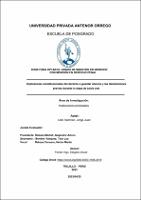Mostrar el registro sencillo del ítem
Implicancias constitucionales del derecho a guardar silencio y las declaraciones previas durante la etapa de juicio oral
| dc.contributor.advisor | Florián Vigo, Olegario David | |
| dc.contributor.author | Tello Ramírez, Jorge Juan | |
| dc.creator | Tello Ramírez, Jorge Juan | |
| dc.date.accessioned | 2023-08-24T21:21:53Z | |
| dc.date.available | 2023-08-24T21:21:53Z | |
| dc.date.issued | 2023 | |
| dc.identifier.uri | https://hdl.handle.net/20.500.12759/11063 | |
| dc.description.abstract | El objetivo de la presente investigación fue analizar y determinar cuáles son las implicancias constitucionales que tiene en el derecho a guardar silencio la introducción de las declaraciones previas durante la etapa de juicio oral. La investigación tuvo un enfoque mixto y un diseño exploratorio secuencial, siendo que la muestra estuvo conformada por fuentes documentales y jurisprudencia, así como por abogados penalistas de la ciudad de Trujillo, durante el período 2021; se usaron como instrumentos una guía de análisis documental, y dos cuestionarios debidamente validados. La investigación concluye que, la afectación a la imparcialidad del juez, la vulneración de la presunción de inocencia y la vulneración al debido proceso en un 65.2% constituyen las implicaciones constitucionales que tiene en el derecho a guardar silencio la introducción de las declaraciones previas durante la etapa de juicio oral; donde se tienen un Rho= 0.696 (correlación positiva alta), y significancia (p < 0.01). En razón a ello, resulta incorrecta la oralización de las declaraciones previas del imputado dentro del juicio oral, cuando el acusado opte por ejercitar su derecho a guardar silencio, en vista a que, este escenario provocaría el incumplimiento y vulneración de las garantías constitucionales que inspiran el debido proceso y la tutela jurisdiccional efectiva, así como atenta la noción del Derecho Penal garantista. | es_PE |
| dc.description.abstract | The objective of the present investigation was to analyze and determine what are the constitutional implications that the introduction of prior statements during the oral trial stage has in the right to remain silent. The research had a mixed approach and a sequential exploratory design, being that a sample was formed by documentary sources and jurisprudence, as well as criminal lawyers of the city of Trujillo, during the period 2021; A documentary analysis guide and two duly validated questionnaires were used as tools. The investigation concludes that, by affecting the impartiality of the judge, 65.2 per cent of violations of the presumption of innocence and 65.2 per cent of violations of due process constitute the constitutional implications for the right to remain silent of the introduction of preliminary statements during the oral proceedings; where there is a Rho= 0.696 (high positive correlation), and significance (p < 0.01). For this reason, the oral statements of the accused in the course of the oral proceedings, when the accused chooses to exercise his right to remain silent, are incorrect, in view of the fact that this scenario would lead to the breach and violation of the constitutional guarantees that inspire due process and effective judicial protection, as well as violates the notion of guaranteeing criminal law. | en_US |
| dc.description.uri | Tesis | es_PE |
| dc.format | application/pdf | es_PE |
| dc.language.iso | spa | es_PE |
| dc.publisher | Universidad Privada Antenor Orrego | es_PE |
| dc.relation.ispartofseries | M_DERE_218 | |
| dc.rights | info:eu-repo/semantics/embargoedAccess | es_PE |
| dc.rights.uri | https://creativecommons.org/licenses/by/4.0/ | es_PE |
| dc.source | Universidad Privada Antenor Orrego | es_PE |
| dc.source | Repositorio Institucional - UPAO | es_PE |
| dc.subject | Silencio | es_PE |
| dc.subject | Juicio | es_PE |
| dc.title | Implicancias constitucionales del derecho a guardar silencio y las declaraciones previas durante la etapa de juicio oral | es_PE |
| dc.type | info:eu-repo/semantics/masterThesis | es_PE |
| thesis.degree.level | Maestría | es_PE |
| thesis.degree.grantor | Universidad Privada Antenor Orrego. Escuela de Postgrado | es_PE |
| thesis.degree.name | Maestro en Derecho con Mención en Derecho Penal | es_PE |
| thesis.degree.discipline | Maestría en Derecho | es_PE |
| dc.subject.ocde | https://purl.org/pe-repo/ocde/ford#5.05.02 | es_PE |
| renati.advisor.orcid | https://orcid.org/0000-0003-1646-2819 | es_PE |
| renati.author.dni | 18161990 | |
| renati.advisor.dni | 18165036 | |
| renati.type | https://purl.org/pe-repo/renati/type#tesis | es_PE |
| renati.level | https://purl.org/pe-repo/renati/level#maestro | es_PE |
| renati.discipline | 421357 | es_PE |
| renati.juror | Rebaza Martell, Alejandro Arturo | |
| renati.juror | Benites Vásquez, Tula Luz | |
| renati.juror | Rebaza Carrasco, Héctor Martín | |
| dc.publisher.country | PE | es_PE |
| dc.date.embargoEnd | 2026-08-24 |




